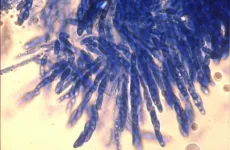INFORMATION:
The study was led by researchers at UCL, the University of Edinburgh, King's College London and Queen Mary University of London, along with co-authors in the UK, Bulgaria, Canada, India and Germany.
Neurological symptoms like fatigue common in mild COVID
2021-06-04
(Press-News.org) Neurological and psychiatric symptoms such as fatigue and depression are common among people with Covid-19 and may be just as likely in people with mild cases, according to a new review study led by a UCL researcher.
By reviewing evidence from 215 studies of Covid-19, the meta-analysis published in the Journal of Neurology, Neurosurgery and Psychiatry reports a wide range of ways that Covid-19 can affect mental health and the brain.
Lead author Dr Jonathan Rogers (UCL Psychiatry and South London and Maudsley NHS Foundation Trust) said: "We had expected that neurological and psychiatric symptoms would be more common in severe Covid-19 cases, but instead we found that some symptoms appeared to be more common in mild cases. It appears that Covid-19 affecting mental health and the brain is the norm, rather than the exception."
The research team systematically reviewed evidence from 215 studies of Covid-19 from 30 countries, involving a total of 105,638 people with acute symptoms of Covid-19, including data up until July 2020 (acute refers to the main disease stage, rather than longer-term impacts). The studies varied as to which symptoms they were tracking, and the research team pooled data to compare how common each symptom was among the studies that tracked it.
Across the whole dataset, the most common neurological and psychiatric symptoms were: anosmia (loss of smell; reported by 43% of patients with Covid-19), weakness (40%), fatigue (38%), dysgeusia (loss of taste; 37%), myalgia (muscle pain; 25%), depression (23%), headache (21%) and anxiety (16%). They also identified the presence of major neurological disorders such as ischaemic stroke (1.9% of cases in the dataset), haemorrhagic stroke (0.4%) and seizure (0.06%). Patients with severe Covid-19 were overrepresented in the dataset as a whole, as most of the studies focused on hospitalised patients, and even the studies of people outside of hospital included few people with very mild or no symptoms.
But among people with symptomatic acute Covid-19 who were not hospitalised, neurological and psychiatric symptoms were still common: 55% reported fatigue, 52% loss of smell, 47% muscle pain, 45% loss of taste, and 44% reported headaches. The researchers say it's still possible that such symptoms are just as common in severe cases, as mild symptoms might not be reported by a patient in critical care.
While this review did not investigate causal mechanisms, the researchers suggest a few possible explanations. In the acute phase of the illness, inflammation has been found in the brain, which may explain some of the symptoms. Psychosocial factors relating to the context of the global pandemic may play a role, as people who are acutely ill may feel isolated when they cannot see their family or friends, which may explain why depression and anxiety have been found in some Covid-19 studies to be more common than in other viral illnesses such as the flu.
Dr Rogers said: "Many factors could contribute to neurological and psychiatric symptoms in the early stages of infection with Covid-19, including inflammation, impaired oxygen delivery to the brain, and psychological factors. More studies are needed to understand these links better."
Joint senior author Dr Alasdair Rooney (University of Edinburgh) said: "Neurological and psychiatric symptoms are very common in people with Covid-19. With millions of people infected globally even the rarer symptoms could affect substantially more people than in usual times. Mental health services and neurological rehabilitation services should be resourced for an increase in referrals."
The researchers found that most of the studies looked at a small subset of neurological symptoms, such as fatigue or muscle aches, while often neglecting symptoms of mental illnesses such as depression, anxiety and post-traumatic stress disorder (PTSD), as well as stroke and seizures, so they say more studies are required into the full range of symptoms linked to Covid-19.
ELSE PRESS RELEASES FROM THIS DATE:
70-year-old coffee-killing fungus brought back to life to fight the disease
2021-06-04
Researchers have re-animated specimens of a fungus that causes coffee wilt to discover how the disease evolved and how its spread can be prevented.
Coffee Wilt Disease is caused by a fungus that has led to devastating outbreaks since the 1920s in sub-Saharan Africa, and currently affects two of Africa's most popular coffee varieties: Arabica and Robusta.
The new research shows that the fungus likely boosted its ability to infect coffee plants by acquiring genes from a closely related fungus, which causes wilt disease on a wide range of crops, including ...
Arctic sea ice thinning faster than expected
2021-06-04
Sea ice in the coastal regions of the Arctic may be thinning up to twice as fast as previously thought, according to a new modelling study led by UCL researchers.
Sea ice thickness is inferred by measuring the height of the ice above the water, and this measurement is distorted by snow weighing the ice floe down. Scientists adjust for this using a map of snow depth in the Arctic that is decades out of date and does not account for climate change.
In the new study, published in the journal The Cryosphere, researchers swapped this map for the results of a new computer model designed to estimate snow depth as it varies year to year, and concluded that sea ice in key ...
Anxieties about side-effects and perceived trial uncertainties driving vaccine hesitancy
2021-06-04
Concerns about side effects and whether vaccines have been through enough testing are holding people back from getting vaccinated against COVID-19, according to a new report.
Data from an international survey of 15 countries* which ran between March and May this year showed that these were the most commonly cited reasons for not having had a coronavirus vaccine yet, in addition to not being eligible for one. Respondents' other commonly reported reasons included concerns about not getting the vaccine they would prefer, and worries over whether the vaccines are effective enough.
Led by Imperial College London's Institute of Global Health Innovation in collaboration with YouGov, the survey also looked at trust in COVID-19 vaccines. ...
Many COVID-19 patients produce immune responses against their body's tissues or organs
2021-06-04
A University of Birmingham-led study funded by the UK Coronavirus Immunology Consortium has found that many patients with COVID-19 produce immune responses against their body's own tissues or organs.
COVID-19 has been associated with a variety of unexpected symptoms, both at the time of infection and for many months afterwards. It is not fully understand what causes these symptoms, but one of the possibilities is that COVID-19 is triggering an autoimmune process where the immune system is misdirected to attack itself.
The study, published today (June 4) in the journal Clinical & Experimental Immunology, investigated the frequency and types of common ...
Prior COVID-19 infection reduces infection risk for up to 10 months
2021-06-04
Under embargo until Thursday 3 June, 23:30 UK time / 18:30 US Eastern time
Peer-reviewed observational study in people
Prior Covid-19 infection reduces infection risk for up to 10 months
The risk of being infected with SARS-CoV-2, the virus that causes Covid-19, is substantially reduced for up to 10 months following a first infection, according to new findings from the Vivaldi study led by UCL researchers.
For the study, published in Lancet Healthy Longevity, researchers looked at rates of Covid-19 infections between October and February among more than 2,000 care home residents and staff, comparing those who had evidence of a previous infection up to 10 months earlier, as determined by antibody testing, with those who had ...
Pfizer-BioNTech vaccine recipients have lower antibody levels targeting the Delta variant
2021-06-04
Levels of antibodies in the blood of vaccinated people that are able to recognise and fight the new SARS-CoV-2 Delta variant first discovered in India (B.1.617.2) are on average lower than those against previously circulating variants in the UK, according to new laboratory data from the Francis Crick Institute and the National Institute for Health Research (NIHR) UCLH Biomedical Research Centre, published today (Thursday) as a Research letter in The Lancet.
The results also show that levels of these antibodies are lower with increasing age and that levels decline over time, providing additional evidence in support of plans to deliver a vaccination boost to vulnerable people in the Autumn. ...
Immunotherapy drug delays recurrence in kidney cancer patients
2021-06-04
An immunotherapy drug given after surgery improved disease-free survival rates in patients with kidney cancer at high risk of relapse.
Interim results of a phase 3 trial of adjuvant therapy revealed a 32% decrease in the risk of recurrence or death with pembrolizumab compared with a placebo
This is the first positive study of immunotherapy in patients with kidney cancer at high risk of relapse.
BOSTON -- Treatment with an immunotherapy drug following kidney cancer surgery, prolonged disease-free survival rates in patients at high risk for recurrence, according to an interim ...
Genetic base editing treats sickle cell disease in mice
2021-06-03
Sickle cell disease (SCD) is the most common deadly genetic disorder, affecting more than 300,000 newborns worldwide each year. It leads to chronic pain, organ failure, and early death in patients. A team led by researchers at the Broad Institute of MIT and Harvard and St. Jude Children's Research Hospital has now demonstrated a base editing approach that efficiently corrects the mutation underlying SCD in patient blood stem cells and in mice. This gene editing treatment rescued the disease symptoms in animal models, enabling the long-lasting production of healthy blood cells.
The root of SCD is two mutated copies of the hemoglobin gene, HBB, which cause red ...
Secret shopper study sheds light on barriers to opioid treatment for women
2021-06-03
After a 2020 Vanderbilt University Medical Center study showed women have a difficult time accessing treatment for opioid use disorder (OUD), investigators analyzed comments received from the study's participants to further shed light on barriers to care, which included everything from long on-hold times to difficult interactions with clinic receptionists during phone calls seeking appointments.
A "secret shopper" study published in JAMA Network Open in 2020 used trained actors trying to get into treatment for opioid use disorder in 10 U.S. states. More than 10,000 unique "patients" were randomly assigned to be pregnant or non-pregnant and have private or Medicaid-based insurance to assess differences ...
Athletic competition after COVID
2021-06-03
MEMPHIS, Tenn. - Cardiovascular imaging demonstrated no evidence of myocardial injury or myocarditis in athletes after COVID-19 infection, according to a research letter published in Circulation by Le Bonheur Children's Hospital and the University of Tennessee Health Science Center cardiologists. The screening and evaluation was conducted by the Le Bonheur Children's Heart Institute Sports Cardiology team, Benjamin S. Hendrickson, MD, Ranjit R. Philip, MD, and Ryan E. Stephens, NP-C, MBA, and Le Bonheur Director of Cardiac MRI Jason N. Johnson, MD, MHS. Researchers say this study confirms existing recommendations ...



